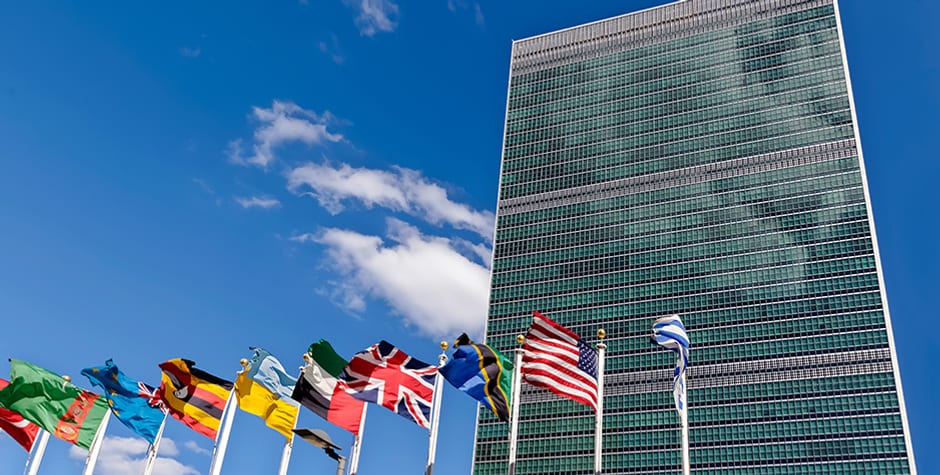Taking the Fight for Persecuted Christians in the United Arab Emirates and Mali to the UN
Christians all over the world are persecuted and discriminated against because of their faith. In fact, according to a report by Open Doors, “more than 360 million Christians live in places where they experience high levels of persecution, just for following Jesus.” In some countries persecution includes, but is not limited to, oppressive and discriminatory laws that criminalize and imprison Christians for peacefully practicing their faith. In other countries, such as Nigeria, being a Christian makes you a target for extremist groups who burn down villages and kill innocent people simply because they are Christians.
As part of our ongoing efforts to shed light on religious persecution, we filed two reports highlighting religious discrimination and persecution in the United Arab Emirates (UAE) and Mali for the 43rd Session of the Universal Periodic Review (UPR).
In the UAE, the government has established separate standards for how Christians are treated and discriminates between non-citizen Christians and Christian citizens. As we stated in our report:
Non-citizen Christians “are free to worship privately, but the government does not allow them to evangelize or pray in public.” In contrast, Christian converts who are citizens “risk losing inheritance and parental rights, being forced to marry, being fired or placed under pressure to work for ‘free.’” The UAE’s “government will act against any Christians attempting to speak openly about their faith, because evangelism is illegal and punishable under the law.” As a result of these types of laws, there have been reports of converts who had to flee for their lives or were forced into marriage.
As of 2019, seventy-nine out of 198 countries studied had laws banning blasphemy. Nowhere is this more evident than in the Middle East and North Africa, where “18 of the 20 countries (90%) in the region have laws criminalizing blasphemy.” The UAE is one of these countries. In the UAE, those found guilty of blasphemy can face imprisonment and be forced to pay a fine. For example:
In February 2020, a UAE court sentenced Akhilesh Pandey to fifteen years imprisonment and imposed a fine of approximately 500,000 dirhams for allegedly committing blasphemy. Pandey was accused by a co-worker of “hurting religious sentiments.” Pandey’s wife Ankita believes that his accuser and alleged witnesses “conspired and filed a complaint” because of Pandey’s “objecting to the wrongdoings of some of his subordinates.”
Furthermore, in the UAE, Christians and other religious minorities depend on the government to grant land to build places of worship. Because of this policy, Christians lack adequate spaces to get together for worship. The few churches that do exist must “accommodate multiple congregations of various nationalities and languages.” For example, “there are more than 700 Christian congregations and only 45 sanctioned church buildings in the UAE.” To help “fix” this issue, the UAE has only promised to build 19 more non-Muslim places of worship. As we stated in our report, it appears the UAE has only been taking steps to appear open and tolerant without actually promoting religious liberty.
We told the UN that if the UAE “wants to be seen as a bastion of religious freedom in the Middle East, it must create a pathway for religious minorities to open their own churches and openly practice the tenets of their faith.”
In its 2022 World Watch List, Open Doors listed Mali as the 24th worst country for Christians to live. Christians, particularly in the northern regions, face violence from Fulani herdsmen. Furthermore, those who convert from Islam to Christianity are particularly at risk for persecution. As we further stated in our report:
[E]xtremist groups are terrorizing communities by forcing rural communities to convert to Islam by taking people’s property and preventing people from bringing their crops to market. Furthermore, anyone who refuses to convert to Islam is at risk of being killed. Christians have to be cautious about practicing their faith openly because they are constantly targeted with threats and physical attacks. Some [attacks are] even coming directly from imams incessantly threatening Christians in their teachings.
Every day, Christians in Mali live with the fear that their village may be attacked by radical jihadists. In our report, we highlighted many stories of Christians being attacked and killed. For example:
In June 2022, jihadists entered several villages over two days, killing at least 132 people. Several survivors were interviewed and said they heard gunfire and jihadists shouting “Allahu akbar.” One of the survivors said he witnessed an old man being shot and heard a bullet go past his ear before he became unconscious; when he woke up around midnight, he felt bodies on top of him and the smell of blood and smoke in the air.
It is critical that these countries reform their discriminatory laws to provide for religious freedom for everyone. They must also undertake measures to protect Christians from religiously motivated violence.
Here at the ACLJ we will continue to highlight the persecution of Christians around the world and fight for their right to openly practice their faith. Attacks on religious freedom cannot, and will not, go unchecked.
You can learn more about the other UPRs we’ve filed at ACLJ.org/UPR.
